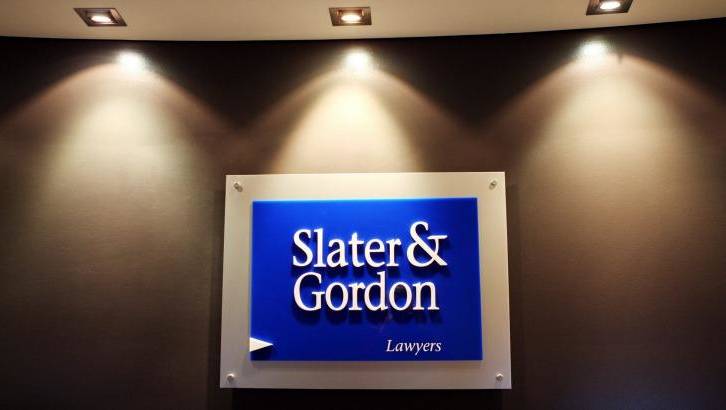An ambitious Australian company spends up big on a massive overseas asset.
It over-reaches, pays too much, books a massive write-down then finds itself the target of a law firm specialising in shareholder class actions.
In 2003, it was National Australia Bank in the stocks over its purchase of US home lender HomeSide – and law firm Slater & Gordon was throwing the rotten fruit.
Slater’s was alleging that NAB had failed to properly inform the market of HomeSide’s dire situation ahead of a $3 billion write-down.
“The same requirement that [NAB and] every other board has in the Australian and the US market, is to provide ongoing and complete disclosure of information that’s relevant to the price of securities,” said then-managing partner Andrew Grech.
The threatened class action came to nothing.
Now it is Grech and Slater & Gordon who have had to go cap in hand to NAB. The hulking write-down on Slater’s UK acquisition Quindell has put the company in a position described by analysts as “financially precarious”.
And it is Slater & Gordon – once known as the union law firm, staffed by true believers wielding their law degrees for the greater good – being accused of laxness in its disclosure to shareholders about its financial and regulatory problems.
The company’s long-time rival Maurice Blackburn is building a shareholder class action against it for this alleged tardy disclosure – along with another from up-and-comer ACA Lawyers, whose staff list includes several former Slater & Gordon lawyers.
BusinessDay can reveal that current and former staff of Slater and Gordon – many of whom have been left with significant debts on the law operation’s more-than-decimated scrip – are among those who have joined the class actions.
Further, Maurice Blackburn has estimated its proposed class action could put a $100 million-plus dent on Slater & Gordon’s future profits.
The company’s problems sparked criticism. These included that it was being run like a personal injury factory, that it is under pressure to settle cases quickly, that its listed model has limited the careers of many of its staff and that its Australian business has stagnated.
But a spokeswoman for Slater & Gordon says there is “no basis” for allegations the company is under pressure to settle cases, that suggestions careers of staff are limited are “completely untrue” and its staff are highly motivated.
This weekend is the deadline for the company to strike a new deal with bankers NAB and Westpac on the $741 million in debt it is carrying – the bulk of which expires in March 2017 making it the company’s sword of Damocles.
Failure to reach a deal with its bankers could spell the demise of the group.
Slater & Gordon’s debt woes relate to its horror acquisition of Quindell – a company beset with accounting issues that the Australian group picked up despite blaring warnings from the UK market.
“One of the enduring mysteries is why they paid the amount they did for it,” says Martin Lawrence of Ownership Matters, the proxy adviser. “They bought a distressed company that was getting overdraft financing.”
If it manages to strike a repayment deal, the 81-year-old Slaters still faces a long list of troubles: the looming class actions, an investigation by the UK Serious Fraud Office, and a share price now wallowing at incredible lows – below 30¢ – having traded at over $8 per share just over a year ago.
While it may resolve its most pressing problem, as far as investors and its banks are concerned the company is likely to be viewed warily for quite some time.
True believers
Over the years Slater attracted bright lawyers who would go on to be politicians including a prime minister, Julia Gillard. Gillard declined to comment on her former employers’ woes.
Former Slater & Gordon lawyer Adam Bandt, who became the first Greens MP to win a lower house seat, says it is disappointing to see the firm in this position.
“I chose to work at Slater & Gordon because of its proud legacy of standing up for working people and I know that’s why many others are there, too,” Bandt says.
“It is disappointing to see Slaters led to this position and I’m sure many people working there are feeling it hard,” Bandt says.
“It would be a step backwards for social justice in Australia if Slaters can’t find a way to keep doing what it has done so well for many years.”
With the help of lashings of debt and ambition, Slater & Gordon was able to catapult itself from socially conscious Melbourne labour law firm to trans-national listed law conglomerate in a little more than a decade.
Along the way, it was a force for good in the lives of countless people, who would have struggled for legal representation without the firm. “They took on large and difficult and complex cases in situations where a lot of others would not have been prepared to do that,” one former senior Slater & Gordon lawyer said this week.
Slater & Gordon had almost gone under twice in recent history but the once-socialist law firm emerged from these crises with an entrepreneurial – some at the time said brash — attitude.
It took advantage of changes to personal injury laws in the early 2000s, to snap up dozens of tiny law firms operating in the field and built scale.
Led by solicitor Andrew Grech – the likeable, confident and charming son of Broadmeadows migrants from Malta –Slater and Gordon floated in 2007 (the first law firm in the world to do so) after swallowing up five firms in two years and personal injury cases became its primary focus.
The first UK acquisition landed in 2012 with Russell Jones and Walker. Others quickly followed.
The acquisition of each firm boosted the “work in progress” line in Slater & Gordon’s accounts, indicating there would be continual growth in the firm’s revenues as each case was settled.
And then came the big takeover – the professional services arm of UK conglomerate Quindell in late March, 2015.
Grech sold it as a “transformative” transaction. It was about as big as Slater and Gordon, but it came with baggage.
In April 2014, US short-selling firm Gotham City Research published a devastatingly detailed report on Quindell’s accounting methods which concluded up to 80 per cent of Quindell’s reported profits were “suspect” and highlighted a host of other concerns including the company’s meteoric rise from a country club in bucolic England to a major legal force.
Slater and Gordon ploughed on, inking the deal on June 1. It funded the $1.26 billion acquisition with an $890 million rights issue – priced at $6.37 a share – and $375 million of new bank debt.
Things went downhill quickly from there.
Within 24 days of the deal being sealed, it emerged Slater & Gordon was under investigation by the Australian Securities and Investment Commission over its books
Then at its annual results in late August and in the midst of ASIC’s probe, Slater & Gordon said it would reclassify how it dealt with its work in progress (WIP) – cases still on foot that have not settled or reached judgment.
Work in progress is a law firm’s biggest asset.
But, as one senior former Slaters lawyer noted this week, “work in progress at a ‘no win, no fee’ law firm is difficult to value; it’s worth 100 per cent or nothing”.
That same month, the UK’s Serious Fraud Office announced it was investigating Quindell for accounting irregularities.
Sudden departures soon followed, including long-standing chief financial officer Wayne Brown in October. By March this year, eight directors of Slater & Gordon’s UK businesses, including the man who oversaw the due diligence program for Quindell but had not taken up his rights in the capital raising Neil Kinsella, had left.
Short-sellers, which make money when share prices dive, smelled blood and began targeting Slater & Gordon shares.
Then in November the British government announced it was considering changing whiplash injuries from motor vehicle accidents, with clear implications for Quindell sending its shares down 30 per cent. Grech soothed the market and reaffirmed the company’s profit target, for the second time in a few days.
Eighteen days later, on December 17, Slater & Gordon finally withdrew its guidance, admitting it would not achieve its forecast profit.
In February came arguably the biggest blow of all.
The company posted a $958 million first-half loss including a mammoth $876.4 million write-down of its assets, with Quindell accounting for the bulk of it. Its restated cash flows also highlighted its negative operating cash flow – $83.3 million in just six months. Grech’s offer to resign was refused by the board.
ASIC’s confirmation its investigation had closed following the write-downs helped stem the share rout.
But by then so much damage had been done with the $2.2 billion giant now a $100 million shadow of itself and its bankers stepped in.
Fall from grace
As far as listed Australian companies go, the speed of its fall from grace is hard to top.
“The firm’s intention was to be the [personal injury] factory in the common law world,” says Steven Lewis, who headed up Slater & Gordon’s NSW commercial litigation and class action division until 2014.
“They felt they could industrialise the UK PI legal process, like they did in Australia and it’s come a cropper.”
Just why Slater and Gordon pushed on with the Quindell acquisition remains a mystery. “It’s got to be in the five worst acquisitions of all time in that it has almost killed the company,” says Ownership Matters’ Lawrence.
Highly regarded fund manager and investor Peter Morgan says Slater & Gordon made a mistake going overseas. “It gets back to the basic the fact that Australian companies reckon they can take on the world and it goes pear shaped,” he says.
“It all looked good on paper and now it’s coming home to roost. I’ve never owned any stock. If I want a punt at the races I’ll go out to Randwick on a Saturday.”
Some also maintain the listed law firm model was a mistake from the start.
“It’s symptomatic of the increasing trend towards the commercialisation of the practice of law, of the traditional model of the lawyer being an independent operator seeking to advance the interests of their client,” one ex-Slater lawyer says.
Another points to how switching from a firm structure to a corporation removed the traditional law firm incentive structure – the tantalising promise of a partnership to strive for. “It’s an age-old career path in law. Slater & Gordon have thrown that out the window.”
A Slater & Gordon spokeswoman say the assertion the career progression of staff was limited was “completely untrue” and it is was false to suggest the group did not want to pay for experienced staff or cap salaries.
Analysts and other market watchers have predicted the firm would be under pressure to quickly settle the thousands of small claim cases Slater & Gordon has on its books to improve its cash flow.
“Let’s face it, they are being run for their banks and the banks are not interested in WIP or anything else, they are interested in cash. How do you generate cash? You settle the case,” Lawrence says.
Slater & Gordon’s bankers are also in a bind. They are dealing with a company whose only asset is WIP that is tied to individual lawyers who can up sticks at any time.
According to one banking analyst, the banks are likely therefore to not on-sell the debt and instead take a 50¢ to 90¢ in the dollar haircut on the debt.
If Slater and Gordon strikes a deal with its banks, it will still need to sell its recovery story to sceptical investors while two potential class actions hang over its head.
“We expect this will certainly rival and possibly exceed some of the larger shareholder actions we’ve run, which historically include the nation’s five and only shareholder actions to settle for over $100 million,” says Maurice Blackburn senior associate Lee Taylor of the firm’s potential action against its rival.
ACA Lawyers principal Bruce Clarke says current and former staff have registered their interest in the action.
“We’ve also had interest from institutional investors both from Australia and the UK. We’ve also had interest from institutions from other countries,” he says.
“There seems to be very strong indication that this is a matter that will proceed.”
Beyond the class actions, key questions about Slater & Gordon’s business model remain, not least of which is whether the rot began and ended with the Quindell acquisition.
While the Australian business at least made a profit in the six months to December 31, of $16 million (before impairments), its expansion was driven, again, by the fruits of its recent acquisitions at home.
The February write-down included a $57 million impairment on the goodwill of its Australian operations – an amount dwarfed by the Quindell write-down, but still significant. “If you were saying it is a ‘good Australia, bad UK’ story then you should consider that,” Lawrence says.
However, Slater & Gordon disagrees with these assessments.
“The Australian business is performing better than it has any time in our history. As per our half-yearly results our intention is to continue grow the Australian business, both in the area of personal injury law and general law,” a Slater & Gordon spokeswoman says.
Slater & Gordon’s share price woes have affected more than just mum and dad investors and the institutions invested in the stock that was once a top 100 company.
Over the years Slater & Gordon staff participated in a generous company loan scheme to buy company shares with loans to staff for Slater & Gordon shares topping $8 million at June 30, according to the company’s annual report.
Sources said staff bonuses have often been paid in part shares and scores of staff have plumped up their holdings using margin loans.
“There are some employees who are justifiably pissed off. This is a horror story for employees,” Lawrence says. “And let’s say you’re solicitor who has vended your business into Slater & Gordon for scrip, it’s a horror story.”
While current and former staff and those on the progressive side of politics contemplate a world without Slater & Gordon others point to the group’s resilience.
“They are survivors,” the former senior Slaters lawyer said. “They may well be able to work their way out of this. But it will take a degree of creativity and perseverance.”
Source: www.bordermail.com.au




